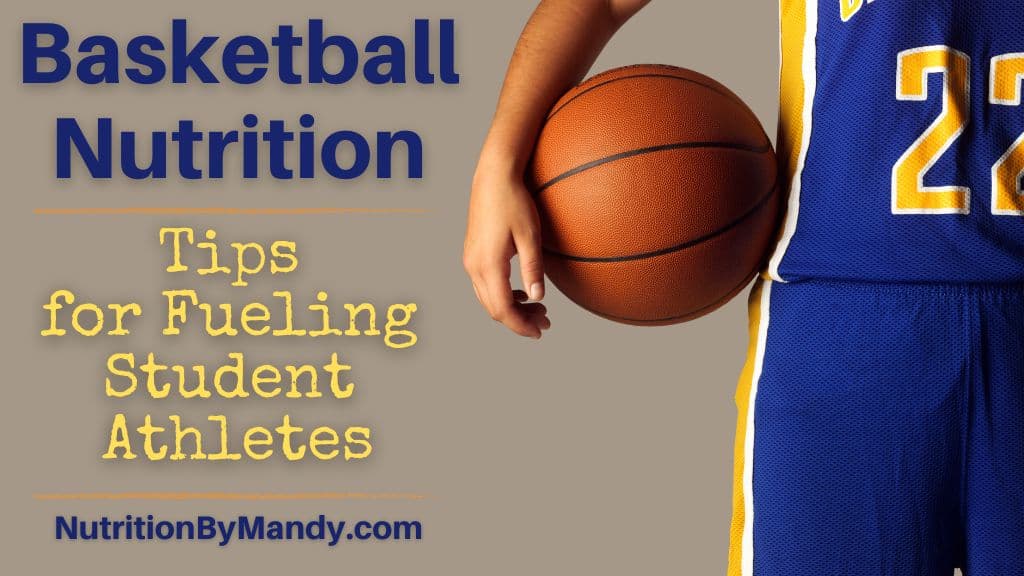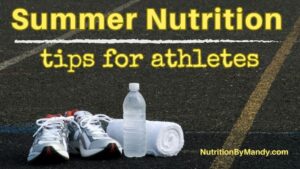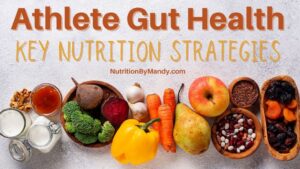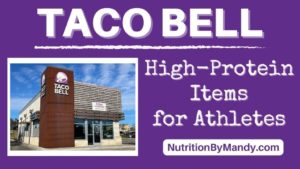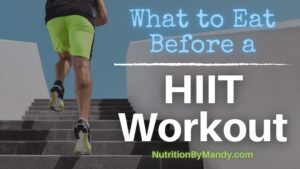Last Updated on January 2, 2025 by Mandy Tyler, M.Ed., RD, CSSD, LD
Basketball Nutrition: Tips for Fueling Student Athletes
It is important for basketball players to have a sports nutrition plan in place to ensure they have the energy needed to perform at their best.
Let’s take a look at basketball nutrition strategies to support student athletes with meeting their nutrition needs before, during, and after activity.
Basketball Nutrition: Fuel Your Workouts and Games
Going into practices and games well fueled should be a top priority for basketball players.
I feel athletes often spend a lot of time focusing on what to eat before a game. However, they spend little time considering what they eat before practice.
It is important for athletes to remember that practice is when they get better. If athletes want to reap the benefits of their workouts, it is important they are fueled to train at their best.
Thus, although the term game is used in the article below, the nutrition strategies apply to both basketball practices and games.
Basketball Nutrition: Pre-Game Meals
Eating a carefully planned pre-game meal can help ensure basketball players go into their competitions well fueled.
When possible, basketball players should plan to eat their pre-game meal ~3-4 hours prior to the start of the competition (1).
Carbohydrates provide basketball players with the energy they need to perform at their best. Therefore, carbohydrates should be at the foundation of an athlete’s pre-game meal.
In addition to carbohydrates, the meal should contain a moderate amount of lean protein, and be low in saturated fat.
Example pre-game meals that basketball players may enjoy include:
- Pancakes, scrambled eggs, fresh sliced fruit
- French toast, Greek yogurt and fruit parfait
- Fruit smoothie, bagel with nut butter and honey
- Turkey sub sandwich, pretzels, apple slices
- Pasta with marinara, sliced chicken, vegetables, breadsticks
- Grilled salmon, steamed rice, green beans, dinner rolls

Foods to Limit Prior to Basketball
In the hours leading up to a game, basketball players should limit foods that are high in fat, fiber, and/or protein.
Eating these foods too close to the start of activity may lead to GI distress during the game (2).
This includes foods such as:
- Heavy cream, cheese, or buttery sauces (alfredo sauce on pasta)
- Fried or greasy foods (French fries, fried chicken)
- Beans and legumes
- High-fiber vegetables (Brussels sprouts, cabbage, broccoli, cauliflower)
- Whole grains (high-fiber)
- Dessert foods (ice cream, fudge)
Each player is unique in terms of what foods they feel best competing on. Thus, it is always best to practice your pre-game meal prior to actual competition.
Basketball Nutrition: Pre-Game Snacks
In the 1-2 hours leading up to the basketball game, athletes should continue to fuel with high-carb snacks (1). Eating easy to digest, carbohydrate-rich snacks will provide basketball players with a quick source of energy as they head into the game.
Ideas for pre-game snacks include:
- Banana, small piece of fresh fruit, dried fruit
- Applesauce squeeze pouch
- Low-fat granola bar, fig bar, cereal bar
- Pretzels, pita chips, snack crackers
- Sports drinks, chews, gels
Basketball Nutrition: During Competition Fuel
Consuming carbohydrates during a basketball game can help provide athletes with a continued source of energy on the court. This can be especially beneficial for athletes who are playing a high number of minutes during a game (1).
Athletes engaged in team sports that involve frequent stopping and starting, such as basketball, should aim to consume 30-60 grams of carbohydrates per hour (1, 2, 3).
Consuming a sports drink during a game can help athletes with replacing fluids and electrolytes, as well as providing a source of carbohydrates for energy.
Athletes should also use halftime as an opportunity to rehydrate and refuel. Halftime snacks such as a banana, an applesauce squeeze pouch, fruit chews, pretzels, sports chews, or sports gels can all provide athletes with an extra source of energy for the second-half of the game.

Basketball Nutrition: Prioritize Recovery Nutrition
Recovery nutrition is particularly important for basketball players when they have limited time (< 24 hours) between workouts or games, such as two-a-day workouts, back-to-back games or tournament play (3).
The three areas of recovery nutrition that basketball players should focus on include:
- Rehydrate: Consume fluid and electrolytes to replace sweat losses
- Refuel: Consume carbohydrates to replace energy stores
- Repair: Consume protein to build and repair muscles

Recovery Nutrition Snacks for Basketball Players
Following a basketball game, athletes should have a plan for snacks they can enjoy that support their recovery nutrition needs.
Eating a snack following activity is especially important if it will be several hours until the next meal. When student athletes have morning practice before school, packing a healthy snack to eat after practice and before class is important.
Easy recovery nutrition snack ideas include:
- Low-fat chocolate milk and granola bars
- Peanut butter and jelly sandwich with low-fat milk
- Turkey and cheese wrap with sports drink
- Beef jerky, pretzels, banana, sports drink
- String cheese, sliced ham, crackers, grapes, water
- Sports bar with sports drink
- Post-workout smoothie
Why is Chocolate Milk Recommended as a Post-Game Drink for Basketball Players?
Chocolate milk is commonly recommended to basketball players as an ideal recovery drink following a workout or game.
A 1-cup serving of chocolate milk provides 8 grams of complete protein and 26 grams of carbohydrates (4). In addition, chocolate milk is 90% water, which helps athletes with rehydrating after exercise.
Therefore, chocolate milk checks all three recovery nutrition boxes. It helps basketball players with meeting their protein, carbohydrate, and fluid needs following activity.
Post-Game Meal Ideas for Basketball Players
When possible, basketball players should aim to follow-up their recovery nutrition snack with a well-balanced meal in the next couple of hours.
Example post-game meals include:
- Pasta with marinara sauce, sliced grilled chicken, salad, breadsticks, low-fat milk
- Grilled salmon, baked sweet potato, steamed broccoli, sliced melon, dinner rolls, tart cherry juice
- Ham sub sandwich, baked chips, grapes, sports drink
- Chipotle Burrito Bowl: Grilled chicken or steak, rice, black beans, corn salsa, lettuce, tomatoes, side tortilla
- CAVA Bowl: Grilled chicken, brown rice, SuperGreens, veggie toppings, hummus, and pita chips.
- Chick-fil-A: Grilled chicken wrap, Greek yogurt parfait
Basketball Nutrition: Focus on Hydration
Hydration should be an important part of a basketball player’s sports nutrition game plan. Dehydration can negatively impact performance and increase the risk of heat-related illnesses (5).
Even minimal dehydration (2% decrease in body water) has been shown to impair basketball skill performance. As dehydration becomes more severe, progressive decreases in performance are seen (6).
Thus, starting practice or competition in an optimally hydrated state and rehydrating during and after activity is important.
Hydration Needs of Basketball Players
It is important to recognize that athletes vary greatly in regard to the amounts of fluid and electrolytes lost in sweat during activity.
A study examining the sweat rate of NBA basketball players found that players lost a range of 1.0-4.6 L of fluid when participating in a Summer League game (7).
In addition to differences in the amount of fluid athletes lose during activity, the amount of sodium lost in sweat also varies. Some athletes are “salty sweaters,” losing higher amounts of sodium in sweat than other individuals.
Therefore, based on differences in fluid and electrolyte losses, it is best for athletes to work with a sports dietitian nutritionist to develop an individualized hydration plan that meets the athlete’s specific needs.

Hydrating Before Basketball
Although hydration needs vary amongst athletes, there are some general pre-game hydration guidelines that basketball players can follow.
Approximately 4 hours prior to the event, it is recommended that athletes drink 5-7 mL of fluid per kg of body weight (5).
For a 175-pound athlete, this calculates to be ~13 – 18 fluid ounces. Consuming approximately 2 cups of fluid (16 fl oz) with the pre-game meal can help basketball players with meeting this goal.
In the hour leading up to the game, basketball players should continue hydrating, aiming to drink approximately 6-8 oz (200-250 mL) of fluid during this time period (1).
Hydrating During Basketball Practice and Games
During basketball practices and games, it is important for athletes to consume fluid and electrolytes to help replace sweat losses and minimize the amount of dehydration that occurs (3).
Although hydration needs vary greatly for athletes, a general rule is to aim to drink ~3-8 ounces of fluid every 15-20 minutes (0.4-0.8 L per hour) of activity (2, 5).
Drinking a big gulp of water or sports drink is equivalent to approximately 1 ounce of fluid. Therefore, athletes should aim for several big gulps from their water bottle every time they come off the court, during time outs, or as the competition allows.
As discussed above, consuming a sports drink during activity can help basketball players with replacing both fluid and electrolyte losses.
In addition, it can provide athletes with a source of carbohydrates, providing quick energy for the court.
Rehydrating After Basketball
Following activity, it is important for basketball players to replace the fluid and electrolytes lost in sweat.
Weighing before and after activity can help basketball players determine how much fluid was lost during the event. For each pound of weight lost during the activity, basketball players should aim to drink 20-24 oz of fluid (2).
Replacing Electrolytes Lost in Sweat
Since athletes also lose sodium in their sweat, consuming food and beverages containing sodium after activity can help with replacing sweat losses. In addition, sodium stimulates thirst, thus encouraging athletes to hydrate. It also helps the body better retain the fluid consumed after exercise (5).
Thus, basketball players can add salty foods to their post-workout meals and snacks, such as:
- Deli meat, cheese, jerky
- Pickles, condiments
- Pretzels, pita chips, baked chips
- Soup, tomato sauce
- Vegetable juice
- Sports drinks, electrolyte drinks
Note: If an athlete has been advised to limit their sodium intake, the athlete should visit with their physician and a sports dietitian nutritionist to develop a plan for meeting their hydration needs.

Basketball Nutrition: Plan Ahead
With busy practice, game, and school schedules, it is essential for basketball student athletes to plan ahead on how they will meet their nutrition needs.
On the weekend, athletes can consider meal prepping breakfast items, healthy snacks, and food to enjoy for a quick grab-and-go lunch. Athletes should also consider what they will eat for dinner on busy weeknights when time is limited.
Taking time to plan ahead can help set student athletes up for sports nutrition success throughout the season.
Basketball Nutrition: Tips for Fueling Student Athletes
You are now set with tips to help student athletes with meeting their nutrition needs before, during, and after basketball practices and games.
For additional sports nutrition tips for student athletes, check out my blog: Protein for Teenage Athletes.
Join the Nutrition By Mandy Email List & Get a Free Athlete’s Grocery List
Click HERE to join the Nutrition By Mandy e-mail list. When you join you will receive a free athlete’s grocery list to print and take with you to the store.
About the Author
Mandy Tyler is a Sports Dietitian Nutritionist in the San Antonio, TX area. She is a Registered and Licensed Dietitian, a Board-Certified Specialist in Sports Dietetics, a Licensed Athletic Trainer, and is a Certified Exercise Physiologist through the American College of Sports Medicine. Mandy has experience working with athletes at the high school, collegiate, and professional levels. She believes the key to reaching one’s full potential, both in everyday life and in sports performance, relies on a healthy nutritional foundation.

If you are looking to take your performance to the next level, make sure to check out my new Sports Nutrition Game Day Guide. This downloadable guide is written to help athletes develop an individualized plan to achieve peak performance on game day.

